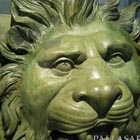Find out about what bronze patinas are, how they are applied, popular colors and finishes for railings, gates sculptures and metal art objects.







CHAPTER 27
THE TRUE STORY OF KISHINEFF
MUCH has been written concerning the outrages at Kishineff which is absolutely untrue. It is far from my intention to deny the facts of the matter.
Atrocities which could not have been surpassed by the Spanish Inquisition were committed on a defenceless and unarmed population, but neither the Emperor nor the Russian government was to blame in the matter.
The first intimation I had of it was from the London Times. I read the accounts with deep horror and asked some Russian friends of mine if it could possibly be true, but no one seemed to know anything about it, though one of them searched the Russian papers. She could find no mention of it in them. A few days later accounts of the horrible outrage were published in the Russian papers; an inquiry was made and those upon whom guilt rested were severely punished.
Two Russians in the town of Kishineff were guardians to their orphan nephew, a lad of about fourteen years of age. He was rich, his father having made a fortune; his uncles, who were his heirs at law, having got into financial difficulties, hit upon the abominable project of murdering the poor boy and annexing his wealth. The lad returned from school one day and was never seen alive again. It was just at the time of the Jewish Passover and the uncles informed the police of the disappearance of the nephew, adding their belief that the Jews had taken his blood for ritual purposes, for that old myth is largely believed in Russia.
The police instituted a search in the Jewish quarters for the unfortunate lad and with the assistance of the uncles soon found the body, which had been quite drained of blood, in the garden of a Jew.
The Christian population was much inflamed against the unhappy Jews, who were, of course, unable to give proofs of their absolute innocency in the matter.
Jew baiting is a form of sport only too common in Russia; so a terrible vengenace was planned; word was sent to all the Jews in the neighbourhood that as they had for their Passover Feast taken the blood of a Christian so would the Christians pour out to their God on Easter the blood of the Jews. The rich Jews in the town went to the governor and besought his protection. They paid for it too with all their possessions.
On Easter Sunday morning a guard was placed outside their houses and they were warned not to stir out, but no help or protection was given to the poor Jews whose houses were entered; their children were thrown from the windows and dashed to pieces against the walls and pavements. One young man was nailed to a rude cross in the streets and had all his limbs sawn off; the horrors of hell were let loose upon the most unhappy people. The very worst barbarities committed in the Middle Ages were exceeded.
It was, of course, the duty of the governor to call out the military and protect the help less, but he had been paid in advance, and wished to earn his money; therefore he deliberately cut off all telephone communication, shut himself up in his study, and would give no answer to anyone.
The military authorities went several times to his house for permission to suppress the rioting, but could not get any answer. Like the deaf adder he would not hear, neither did he send any report of the matter to St. Petersburg and the Russians absolutely believed that they were fulfilling the Emperor's desires. In the evening the Russians returned to their houses satisfied with themselves and their work; their horror may be imagined when they found they were to be brought to justice for their terrible doings, for they imagined they had been doing the will of God and the Emperor's orders.
The enquiry into the outrages lasted a long time; the police searched the house of the uncles and found in a cellar plenty of evidence to prove that the poor boy had met his death in his own home; the very clothes which he had worn at school on the last day of his life, the weapon with which the murder had been committed, and many more mute witnesses being found. The wretched uncles were justly punished by being sent to Siberia for life. The ringleaders in the attack on the Jews were sentenced to varying terms of imprisonment, from two years to a few months, according to their degree of guilt, but a terrible punishment was. reserved for the most guilty of all, the governor. All his property was confiscated and he was deprived of his passport and sent to live in a village; in other words, he was outlawed and he is, in the eyes of the law, dead. He can neither write nor receive letters and to support his miserable life he was obliged to take service in a peasant's family and be the general drudge. If they wish, they may beat, kick, starve him and he has no redress.
This man has no land and no rights from anyone. His master will give him food, a sheep-skin coat for winter and a corner of the floor to sleep on at night; he may not go beyond about a mile from the village in any direction. Yet he was a gentleman used to a soft, luxurious life. Russia can inflict no worse punishment than this, but it is very seldom given; I have heard of men condemned to this sentence of outlawry running away and hiding in the woods and becoming" wild men" who stick at no crime; of course, wanting a passport they cannot enter any other village or town and so they will sometimes murder a whole family in order to steal this precious document which must often be utterly useless to them, as a description of the personal appearance of the owner is written in each Russian passport.



